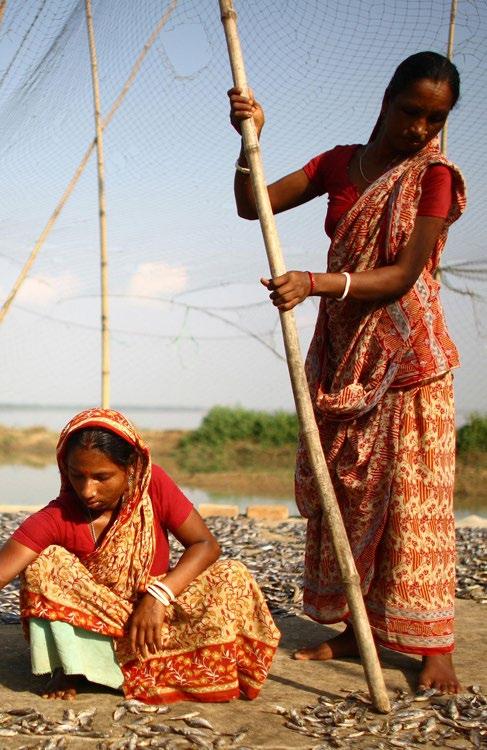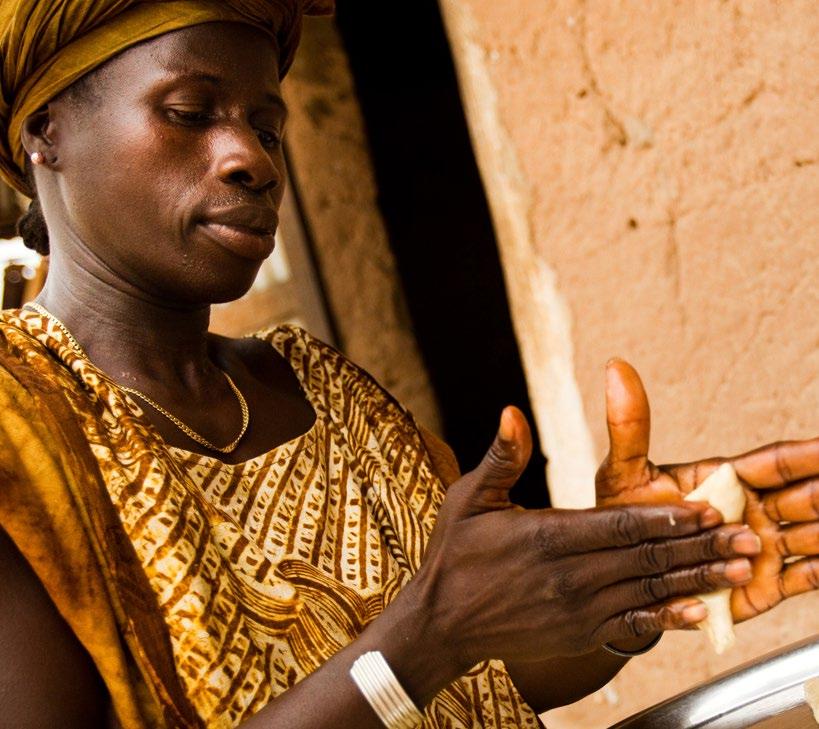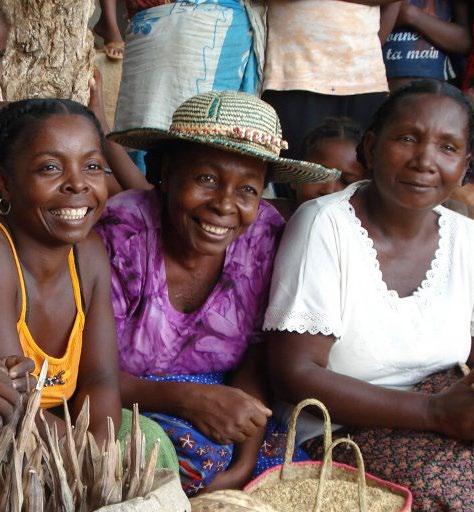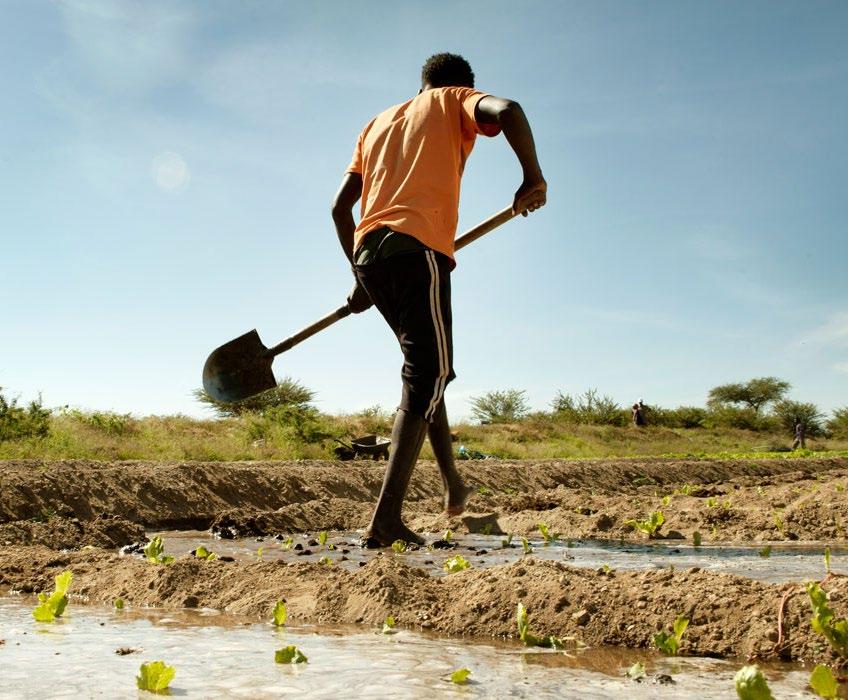Managing Director, Office of Technical Delivery
June 2024



Managing Director, Office of Technical Delivery
June 2024


The International Fund for Agricultural Development (IFAD) is an international financial institution and a specialized United Nations agency dedicated to eradicating rural poverty and hunger. It does so by investing in rural people. IFAD finances programmes and projects that increase agricultural productivity and raise rural incomes, and advocates at the local, national and international level for policies that contribute to rural transformation.
The Office of Technical Delivery is responsible for providing expert technical guidance to IFAD teams engaged in the design and implementation of projects and programmes to deliver the high technical quality investments that facilitate rural transformation, and which comply with IFAD’s mandate and operational policies. The Office ensures IFAD applies and disseminates state of the art knowledge in its investments and evidence on strategic themes and encourages the innovative application of global knowledge and evidence in IFAD investments. This helps countries tackle complex development challenges in fostering inclusive and sustainable rural transformation including mainstreaming areas. The Office of Technical Delivery comprises the Environment, Climate, Gender and Social Inclusion Division (ECG) and the Sustainable Production, Markets and Institutions Division (PMI).
The Office of Technical Delivery works in close coordination with other departments, offices and divisions in IFAD and the Managing Director, works under the direct supervision of the Vice-President of IFAD.
*The structure of IFAD is currently undergoing a recalibration process. The definite set-up of the Office of Development Effectiveness is being finalized and is subject to confirmation of institutional process requirements, which will be confirmed during the recruitment process.
Role:
Managing Director, Office of Technical Delivery
Location:
Rome, Italy
Salary:
USD $152,212 base salary estimate (with adjustments for location, grade level etc).
Benefits:
Excellent benefit package including relocation, health insurance and education allowances.
Managing Directors are responsible for managing an IFAD Office and serve on IFAD’s senior management team. The main focus of Managing Director positions is on strategic leadership of IFAD development effectiveness, innovation and management. The incumbent is responsible for the management and delivery of the Office’s programme of work within an allocated budget. The Managing Director, OTD, manages and directs the human, financial and material resources of the Office and holds responsibility over the effective and efficient delivery of its programme. The incumbent provides authoritative and technical advice to senior management on the, operational results, policies and management, and contributes to the Fund’s strategic planning, policy, organizational change, policy implementation and corporate development by ensuring the technical quality of IFAD’s
programme of work and encouraging a focus on outputs, outcomes and results whilst encouraging innovation. The incumbent provides inputs and advice based on OTD products at the request of the President, vice President and senior management.
As a member of the senior management team of IFAD, the incumbent is expected to contribute to corporate and operational policy discussions and decisions of the Executive Management Committee (EMC), chaired by the President of IFAD.
The incumbent is a member of the IFAD Executive Management Team with a corporate responsibility for the Fund and an active member of IFAD’s Operational Strategy and Policy Guidance Committee (OSC) the Programme Management Committee (PMC) and any other relevant committees pertaining to the area of work.


The Managing Director, leads the work of IFAD’s Office of Technical Delivery by providing strategic leadership and guidance to staff on IFAD’s mandate. The incumbent also guides the direction in the development and interpretation of major policies, regulations and rules, and systems that govern the work of the office and ensure they support office goals and objectives within the overall Fund mandates and strategies. The Managing Directors act as a trusted business/programme advisor with a significant role in authoritative policy advice within the Fund at the senior management level as well as in policy dialogue in their representational activities.
The Managing Director, acts as a champion for change, promoting and endorsing solutions to intractable challenges and has an entrepreneurial and creative approach to developing new, innovative ideas that will stretch the organization to achieve its mandate. They encourage evidence-based knowledge generation and its dissemination in all activities and contribute to resource mobilization activities and to evidence-based policy making at the international, national, and local level to advocate for the extreme poor and food insecure in rural areas. The incumbent advocates for the Organization’s policy positions and expands the Organization’s external visibility and positioning. In order to promote organizational change and keep abreast of technology advancement they set clear priorities for the Office and lead by example.
The Managing Director contributes to the corporate development effectiveness agenda and plans, monitors and supports IFAD’s
collaboration with its institutional partners and member countries on resource mobilization and corporate partnerships, in accordance with agreed priorities, approved programme/budgets, strategic objectives and corporate policies. They promote lessons learnt to inform IFAD’s lending and non-lending portfolio (including country programme strategies, policy engagement initiatives, Private Sector etc.), particularly on issues surrounding food systems transformation, food security, agriculture, agribusiness and rural development. The incumbent oversees the development and implementation of the annual programme and budget of the Office in the context of IFAD’s Strategic Framework and IFAD Replenishment Commitments and provides contributions to the assessment and reporting of corporate impacts of IFAD’s funded projects.
The Managing Director, in coordination with relevant Departments, develops and maintains political and business relationships with key donor Member States and strong collaboration with strategic partner organisations, including borrowers, bilateral and multilateral development agencies, UN agencies, funds and programmes, international financial institutions (IFIs), non-governmental organizations and academic institutions, which among other partnership priorities, can help drive mobilisation of resources from the multilateral climate and environment funds, financial sector and private sector as desirable. Managing Directors serve as designated representatives of the Fund in official United Nations committees and networks, and in IFls, multilateral and bilateral meetings, symposia, fora and Global conferences and other technical bodies upon request of the President, and build organizational networks with peers in major private, public and international institutions.

The Managing Director is responsible for ensuring the transparent, equitable, and efficient management of IFAD’s resources, including human, financial, and material resources. This includes managing staff through workforce planning, recruitment, performance management, and career development. They are also responsible for managing the division’s budget, ensuring accountability and fiduciary integrity. Additionally, they are responsible for managing material resources and promoting knowledge and content management to achieve innovative outcomes and cost-effective processes. The Managing Director also leverages information technology to improve business results, reporting processes, and client services.
Under the guidance of the President and Vice President, the incumbent is responsible for designing and implementing adjustments to the roles and responsibilities as well as the structure of the Office as required to enhance its effectiveness.
In parallel, the Managing Director is responsible for providing intellectual leadership and an authoritative contribution to the integration of knowledge and innovation into IFAD’s operations and overall business model.
This role is pivotal, contributing significantly to strategic decisions and organisational leadership within IFAD. We seek a very senior professional, ideally at the D1 level, as they will be part of the executive management team. This Director will play a vital role in enhancing IFAD’s technical delivery, ensuring projects are well-designed, effectively implemented, and aligned with IFAD’s mission of fostering social development through impactful initiatives.
The ideal candidate will have a strong financial background with proficiency in blended finance and other relevant financial instruments. It is essential to be familiar with IFAD’s loan and grant mechanisms to ensure effective resource utilisation.
Experience in development sectors (NGOs, international development organisations, etc.) is mandatory. While agriculture-specific experience is not required, at least a grounding in rural development and its interaction with the development community and financing is desired. IFAD values a personal and professional commitment to advancing social development.
This role will be responsible for overseeing projects comprehensively, from a high-level perspective down to understanding detailed aspects. The ideal candidate must evaluate project implementation to ensure alignment with objectives and successful outcomes, balancing strategic vision with technical competence to design and oversee impactful projects.
The ideal candidate will have experience in managing operations, policies, and stakeholders effectively. They will maintain technical quality across all operations, ensuring high standards are met. Thus, proficiency in operations and policy management, with a focus on technical quality, is essential.
The ideal candidate will have the authority and seniority necessary, coupled with exceptional people management skills. They’ will be skilled in building and maintaining good team dynamics, fostering collaboration, and effectively engaging all team members. They will demonstrate emotional intelligence, capable of growing and guiding a team without compromising quality.


• Strategic thinking and organizational development: Strategic leadership
• Team building; technical guidence
• Demonstrating Leadership: Leads by example; initiates and supports change
• Learning, sharing knowledge and innovating: Challenges, innovates and contributes to a learning culture
• Focusing on clients: Contributes to a clientfocused culture
• Problem solving and decision making: Solves complex problems and makes decisions that have wider corporate impact
• Managing time, resources and information: Coordinates wider use of time, information and/or resources
• Team Work: Fosters a cohesive team environment
• Communicating and negotiating: Acquires and uses a wide range of communication styles and skills
• Building relationships and partnerships: Builds and maintains strategic partnerships internally and externally
• Managing performance and developing staff: Manages staff and teams effectively
• Level - Advanced university degree from an accredited institution in a related area.
• Degree must be from an accredited institution listed on the World Higher Education Database.
• At least fifteen (15) years of progressively responsible professional experience, including senior management experience within an international organization, financial institution, Multilateral Development Bank, and/or the United Nations system.
• Demonstrated leadership experience with strategic vision and proven skills to manage a complex organization with staff of diverse cultural backgrounds in multiple locations.
• Extensive experience in designing, implementing, and overseeing development projects, with a particular focus on rural development investments, including providing technical leadership and strategic advice to ensure highquality project outcomes aligned with organizational goals and mandates.
• Extensive and proven managerial experience with a focus on people management.
• Progressively responsible management experience in senior level positions.
• Required English (4 – Excellent).
• Areas – Agriculture and related Sciences, Agriculture economics, Economics, Development Economics, rural Development, Agriculture value chain management, life Sciences, food System management, international development, or in any other relevant area.
• Desirable: French, Spanish and/or Arabic (3 – Good).
All correspondence, at this stage, should be via Oxford HR. To apply for this post, click on the “Apply” button on the job advert page, complete our online application form, and submit your CV and cover letter as two different documents, which should be prepared before applying as they will be considered in the application process. The cover letter should be no more than two pages long and explain why you are interested in this post and how your skills and experience make you a good fit.
The document should be saved in PDF in the following format: Your First Name-Your Last Name-Document Name-Date (mmyy) e.g., Pat-Jones-CV-0624-IFAD or Pat-JonesCoverLetter-0624-IFAD.
Closing Date: 23:59 on 24th June 2024 First stage interviews: TBD Final interviews: TBD
All candidates will receive an update regarding their application after the closing date. We advise candidates to add the role email to their safe senders list and regularly check their spam folder.
Equality and diversity are at the core of IFAD’s values. Staff are expected to work collectively and individually to promote a constructive and sensitive approach to others from a variety of backgrounds, where the work of others is valued and respected.
If you have any queries on any aspect of the appointment process, need additional information, or would like to have an informal discussion, please email rosasenent@oxfordhr. com in the first instance.


Exceptional leaders can inspire change and propel purpose-led organisations towards reaching their worldchanging goals. Finding such leaders can be a challenge; and yet their transition into leadership is vital to an organisations mission and success.
Oxford HR is a global leadership consultancy dedicated to searching for and supporting remarkable leaders and teams in purpose-led organisations.
We understand the nuances of purpose-led leadership because we’ve worked in organisations across the breadth of the sector ourselves. We’ve also worked with such organisations since 1995; so we appreciate just what benefits impactful people can bring.